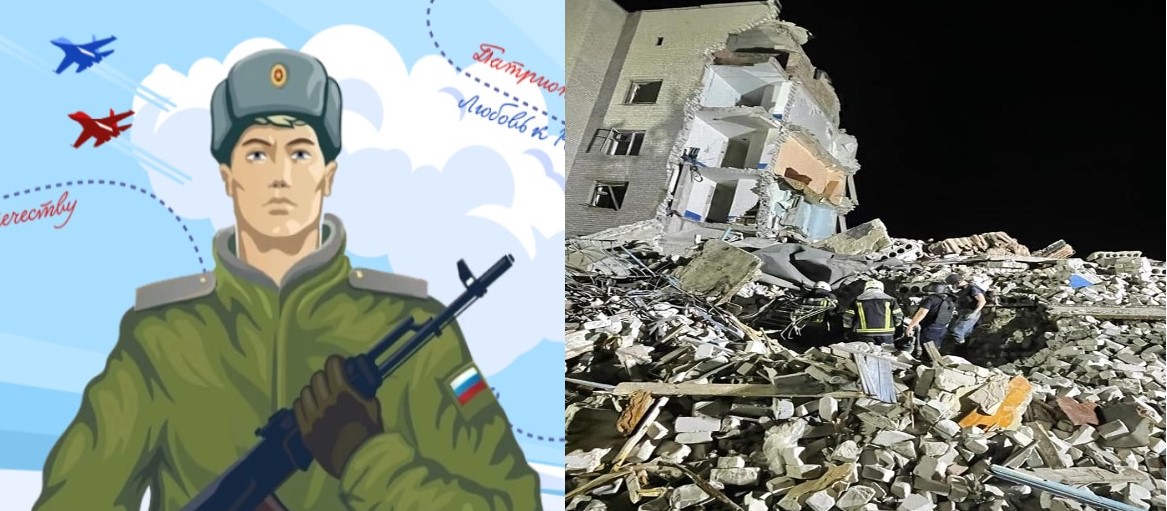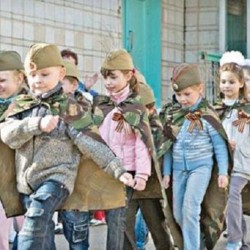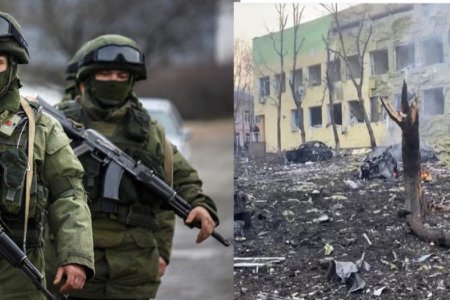
Russia’s minister of education, Sergei Kravtsov has presented something described as a new 11th Grade history textbook for schools in Russia and occupied Crimea. This new book contains sections on what Russia is calling the ‘special military operation’ with even the few excerpts already seen making it clear that the material pushes a seriously distorted, and often openly false, picture of Russia’s full-scale invasion of Ukraine. This should come as no surprise as earlier textbooks are just as misleading about Russia’s invasion and annexation of Crimea in 2014. The main difference lies in the ferocity of state repression against anybody, including children, who dares to question the official version, and the sheer weight of proven facts that teachers and students will be required to ‘not see’ and / or deny.
The new textbook has been prepared by Vladimir Medinsky, former culture minister and adviser to Russian president Vladimir Putin, and Anatoly Torkunov, Dean of MGIMO [Moscow State Institute of International Relations]. Medinsky chairs the so-called ‘Commission on historical education’ which was created by presidential decree on 30 July 2021 and made up, not of historians, but of various state officials, including from Russia’s FSB [Security Service], the Prosecutor General’s Office and Investigative Committee. The commission is supposed to ensure “an aggressive approach to upholding the Russian Federation’s national interests linked with preserving historical memory and the development of educational activities in the area of history”. Its tasks also include analysing “the activities of foreign structures” claimed to harm Russia’s interests and prepare “counter-propaganda measures”.
53-year-old Medinsky has long been a mouthpiece for the kind of historical revisionism seen since Putin came to power. As the head of the Russian Military History Society, created by Putin in 2012, he has promoted monuments to Soviet dictator Joseph Stalin and attempts to rewrite Soviet history, including the shocking excavations at Sandarmokh. He has also claimed that the notorious Molotov-Ribbentrop Agreement which resulted in the USSR and Nazi Germany being allies for the first 15 months of WWII and carving up Poland between them, was ‘a diplomatic triumph’.
Medinsky has already played a role in the production of textbooks which present Russia’s invasion of Crimea without any mention of the soldiers without insignia who seized control, and which claim it to have been a peaceful process. That role makes it somewhat curious that he has only now decided to mention his supposed earlier opposition to the inclusion in textbooks of events after 1999 (when Putin first came to power). He claims that he was earlier overruled by “academics” who insisted that current events should be included, and goes on to assert that he has now understood that he was wrong. He now, purportedly, considers that “the inevitability of the military operation needs to be explained to school students” and asserts that Ukraine is presenting a fantasy version of events.
You can end up imprisoned in Russia at present for presenting the facts about Russian bombing of residential buildings; the atrocities committed in Bucha, Izium, Mariupol and other Ukrainian cities, or even for calling Russia’s actions a war. This does not change the fact that Ukraine’s supposed ‘fantasy version’ is backed by huge amounts of satellite, video, photographic and witness testimony, and is shared by all democratic countries.
Kravtsov has promised that these ‘textbooks’ will reveal all of the reasons behind the ‘special military operation’. This is, in fact, hard to believe since Moscow’s narrative has changed several times already.
Current Time has posted images of the two pages thus far demonstrated of the new textbook. The material claims for example, that “the special military operation aroused a wish to help and show support for its participants among the population. In all subjects of the Russian Federation, a mass volunteer movement developed.” The authors are silent about the mass protests, the prosecutions for merely having a sticker saying ‘No to war’, and the huge exodus of men of call-up age after Putin declared ‘partial’ mobilization. No mention is made either of the recruitment campaign by Yevgeny Prigozhin, founder of the notorious Wagner unit mercenaries, among murderers, violent criminals and other convicted prisoners in Russian prison colonies. There are some totally absurd lies, such as the claim that in the West, mention of Lev Tolstoy has been prohibited.
Some of the omissions are even more radical, and telling. Mediazona recently scrutinized the new version of a textbook for Grade 4 schoolchildren on the World [around us]. This, it transpired, had expunged the internationally accepted term ‘Kyivan Rus’’ and removed mention of Kyiv altogether. The old version of the textbook mentions that Volodymyr christened the people in Kyiv while the new book says only “in the capital”. In another place, Kyiv is replaced by ‘Rus’. The publishers may have received specific instructions, or simply understood which way the political wind is blowing in Russia. After all, Putin’s 2021 essay on what he called ‘the historical unity of Russians and Ukrainians also avoided ‘Kyivan Rus’, using instead the term ‘Ancient Rus’.
Propaganda measures began back in September 2022 with Russia’s inclusion of compulsory sessions in all educational institutions of so-called ‘Conversations about important things’. These are anything but conversations since there is clearly only ever one ‘correct’ opinion, and teachers can download scripts and methodological instructions before each such ‘conversation on the war in Ukraine, the supposedly ‘heroic’ Russian armed forces; so-called ‘Russian traditional values’; ‘patriotism’; and heroism of dying for Russia on Ukrainian soil, etc. Kravtsov announced plans in February 2023 to extend these propaganda sessions to include the children’s parents.
Children and parents have complained from the outset about the methods used to force attendance at these ‘conversations’, including threats that children will be expelled, that the parents will be stripped of their parental rights and other.
Up till now, however, children were forced only to endure such ‘conversations’. Once the new ‘textbooks’ have been widely circulated, young people will be taking matriculation and other exams where they will have to repeat the historical equivalent of 2 + 2 = 5 in order to pass.
The new 11th grade ‘history textbooks’ are to be introduced in September this year with the books to be used everywhere in the following school year. t is imperative that Ukraine liberates all occupied territory well before then as Moscow is clearly planning to foist its distortion of history on Ukrainian children and forcing them to treat the aggressor state as ‘liberators’.



